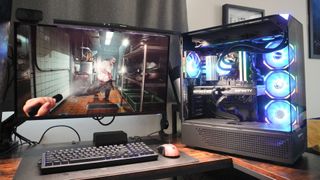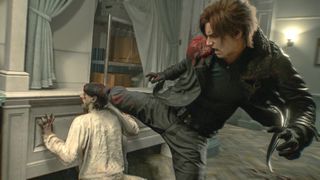Gaming
Explore Gaming
Latest about Gaming

NYT Pips today hints and answers: February 26
By Scott Younker last updated
Get clues and answers for today's NYT Pips to keep your streak going.

NYT Connections today hints and answers for Thursday, February 26 #991
By Scott Younker last updated
Get today's NYT Connections clues and answers for today's puzzle #991 on February 26.

Today's NYT Strands hints and answer: solutions to game #725, February 26
By Alan Martin last updated
We help you find today's Strands answers with some useful hints and tips to win.

Today’s Wordle hints and answer: February 26, 2026, solution #1,713
By Alan Martin last updated
Find out what today's Wordle hint and answer is and get some tips for it, plus see the solutions to previous games.

Resident Evil Requiem turned me into a path tracing believer — and Nvidia's DLSS 4 made it terrifying
By Jason England last updated
I’ve been a path tracing doubter for a while now, but then I got my hands on Resident Evil Requiem. With Nvidia's DLSS 4 and path tracing, immersion is taken to a new level I've never seen before.

I just finished Resident Evil Requiem — and it surpassed my expectations
By Tony Polanco published
Resident Evil Requiem succeeds thanks to its polished gameplay, superb graphics, and engaging story. It has everything fans want from the beloved action-horror franchise.

Xbox isn’t dead yet — here’s how the gaming brand can make a comeback
By Tony Polanco published
With a new CEO at the helm, Xbox has a new chance to reinvent itself and remain competitive. Here are some of the steps it can take to survive.

New Xbox CEO Asha Sharma explains her plans for the future of Microsoft gaming in latest interview
By Scott Younker last updated
Who is Asha Sharma, and what is she saying about Xbox as she takes over the reins from Phil Spencer?

I played every new Virtual Boy game on Switch 2 with Nintendo’s new accessory — and this one was my favorite
By Anthony Spadafora last updated
Nintendo’s Virtual Boy accessory for the Switch 2 might seem like a gimmick but if you grew up with the original, it feels like a breath of fresh air for retro gaming.
Here at Tom’s Guide our expert editors are committed to bringing you the best news, reviews and guides to help you stay informed and ahead of the curve!
 Club Benefits
Club Benefits











